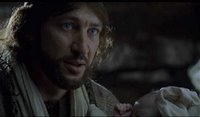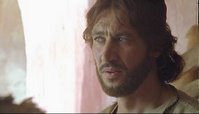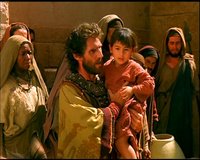Prefiguring Jesus in Jeremiah (1998)

Way back in 2009 I compiled a scene guide for The Bible Collection's 1998 film Jeremiah and concluded a write up of a few additional comments on it by saying:
I'm going to make a separate post another day to look at the way that the Jeremiah of this film prefigures Jesus, particularly the Jesus from the later film in the same series.So I thought it was probably about time I got around to it, particularly as somebody asked me about this the other day.
I don't think there is a cast iron case for saying that the filmmakers were trying to make the Jeremiah of their film into a "type" of Christ. However, there are a few points of interest where the film makes a few additions/interpretations which move things in that direction and particularly in the direction of the Jesus of the Bible Collection's own, later, film Jesus (dir. Roger Young, 1999).
This tendency is most pronounced at the start of the film. Early in the film, when Jeremiah is still a child, he goes to the temple and we're led to believe - by his wide eyes if nothing else - that this is his first time in the city itself. There are quite a lot of similarities, between these scenes and those of The Bible Collection's Jesus being left behind at the temple. The visual identification here is quite strong, not least because the both films are shot on the same set, but there are also similarities in the way the two scenes are shot as well. The scenes include shots from behind the groups as they enter through an archway which frames the temple, and point of view and reaction shots as the two boys both take in the sights of the temple for the first time. It can be argued that this is, if not an actual coincidence, then just a result of the nature of the Bible Collection project, but I'm fairly happy with the school of interpretation which takes each film as a visual "text" not limited by authorial intent.
An additional factor in this scenes is that when Jeremiah enters the temple the shots from his point of view and the accompanying reaction shots convey a mild sense of disgust. It's difficult to pin down what this is due to but it's something that the film expands on when Jeremiah returns to the temple as not only an adult, but significantly as an adult who is now seeing these sights through God's eyes as well as his own. (It's interesting that these later PoV shots, then, become a shot from God's PoV, not just Jeremiah's).
Before all that however, we have the scene where Jeremiah hears God's call. It's notable how the film very much interprets and embellishes this scene - in the Bible Jeremiah says he's "young" but that could mean a young man and there's no specific mention of him being caught up in a vision. These combine then to mean that rather than Jeremiah being a young adult who hears God's call, that this Jeremiah is someone who knows from a very early age that they are in some way very special, chosen by God and set apart for a particular role. Again this nudges the portrayal of Jeremiah towards that of Jesus and increases the similarities between the brief, corresponding scenes of young boys with a special divine calling on their lives visiting the centre of worship for the first time.
A while after this the adult Jeremiah revisits the temple and again we get these PoV shots and the suggestion that Jeremiah is unhappy with what he is seeing. As this opening act of the film progresses it becomes clear that there are two things which are disturbing him.
The first seems to be linked to the slaughtering of the lambs. Whilst this isn't verbally expressed it appears that this is more than mere squeamishness, there seems to be some suggestion that Jeremiah thinks his message, and living faithfully before God, means that this rather unpalatable system is a little defunct.
Secondly, however, these point-of-view / reaction shots are also very familiar, for those who have watched a good number of Jesus films at least, to the shots that frequently precede Jesus' clearing of the temple. And true enough, a little while after this Jeremiah ventures down some of the side streets in the temple region and there he encounters some kind of market trader who is selling idols. The seller tries to persuade Jeremiah to buy something, but Jeremiah's outrage at this affront to God is palpable. And so he turns over the tables, in a way that is classically reminiscent of all those other turning the table scenes (for example, no-one lays a hand on Jeremiah or confronts him, they all just stand back and let him get one with it). This is the film's clearest attempt to draw parallels between its protagonist and Jesus - there's no corresponding passage to this in Jeremiah, it pure invention, or perhaps I should say borrowing.
Another such embellishment is the romantic relationship Jeremiah has with one of his near neighbours. The text of Jeremiah does make it clear Jeremiah is not to marry (16:2), but this is a general command of celibacy, there's no indication that this prevented him from marrying a specific woman.
Whilst the Gospels are silent about Jesus' marital status, in Young's film we find a very similar scenario: Like Jeremiah, Young's Jesus has to reject the woman he looks destined to marry to focus on God's call. This is a not uncommon feature of the Bible Collection series which inserts an extra-biblical love story into several of the biblical narratives which it covers, but the similarity is particularly notable here because in both films the lead character is in love but feels the call on his life in incompatible with this particular romantic relationship.Whilst Jeremiah has things work in a different way (the girl is sold as a slave), at its heart Jeremiah still has to reject the girl because of the call God puts on his life. There are several points of similarity with Jesus (1999) - the relationship appears chaste, but at the stage where an engagement looks on the cards. The girl still lives with her family and both families seem to approve. Then the girl is told it is off suddenly and that this sudden change of course is due to God's call.
There are several other notable similarities between these two films. Firstly, some of the parental relationships are similar, in the first half of the film there are strong relationships with at least one parent and the protagonists is very much still under their wing. Ultimately, however, the lead's parents don't fully understand their child's call and things transition from the son being at the heart of the family home at the start of the film to almost no connection with parents in the respective films' second halves. The protagonists' fathers disappear in the second act having once been very prominent and close to their son in the first half of the film. The reasons are, of course, different - Jeremiah's father's suffers an extreme embarrassment whereas Joseph dies in Jesus - but it seems strange that family relationships that are presented as being so close at the start of the films just disappear without a great deal of regret or mention of them in the second part of the film.
Not unconnected is the similar kind of plot structure the two films share. We start with the protagonist in the family home, there's a brief scene of their childhood, and they look like they are following in the family trade. Then there's a break in those family relationships as God's call on the hero's life starts to come into effect and they leave home. There's a pivotal scene in the wilderness and then their ministry starts, getting up the noses of some, but crucially in both films not all, of the religious and political establishment. Of course, Jeremiah never dies, but there is a scene where he's tied up in a cage in a cruciform pose and hung up high for all the see (and when he's released the camera focusses, briefly, on the damage to his wrists).
A couple of other things that might have been on my mind when I wrote that comment 7 years ago Firstly in the opening scenes - when all is supposedly well in the tribe of Judah - Jeremiah's family arrives in the temple in the middle of some kind of celebratory procession with lots of palm branches being waved in a very similar fashion to those we tend to see in many depictions of Jesus' triumphal entry into Jerusalem. There might be something in the text behind that decision, but, if so, I don't recall it.
Then there's the way that Jeremiah's family are kind of seen as outsiders.At one point Oliver Reed's character asks "Why would God send a prophet from the wilderness when you are surrounded by schooled priests?", but Jeremiah was the son of a priest so this is kind of an odd thing to be added in to the text. Jesus of course was from an unknown family and a backwater town. "Can anything good come from Nazareth?"
Finally there's the presentation of Jeremiah himself. The biblical Jeremiah's suffering is obviously one of his most well-known characteristics, and this is very much to the fore (corresponding to Jesus which doesn't really give much motive for his persecution at the hands of his enemies, but also Jesus as the suffering prophet in general), but other aspects, particularly ones that are quite unlike Jesus (such as chapters 40-49 where Jeremiah prophesies against other nations) are omitted.
This isn't to say that the filmmakers are seeking to present Jeremiah as a type of Christ, or even that the parallels between the two men, or rather the two portrayals is remarkable, but there are certainly some parallels and some of those go a way beyond what is gleaned from the text itself.
======
Incidentally a previous post on this subject referenced Neil MacQueen'S outline to the film which has since been moved. It is now available (again) at Sunday Software
Labels: Bible Collection (The), Jeremiah




















.jpg)
.jpg)




.jpg)















